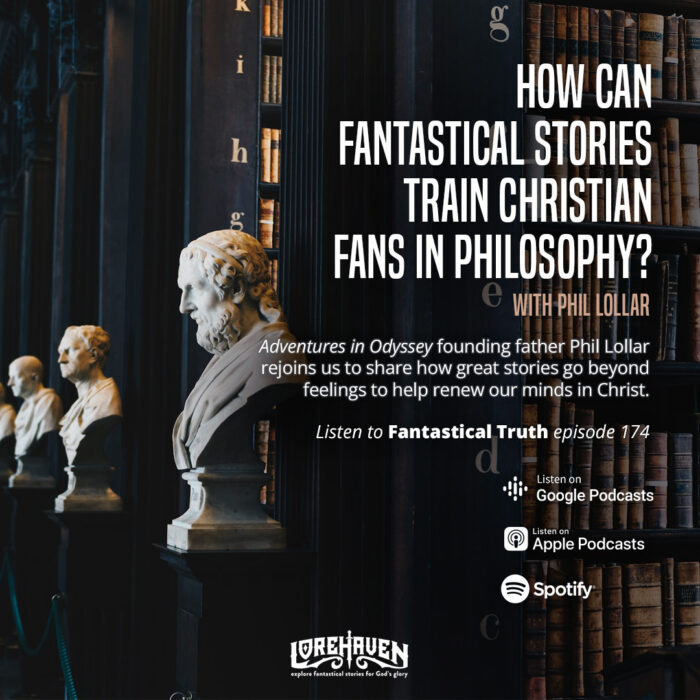174. How Can Fantastical Stories Train Christian Fans in Philosophy? | with Phil Lollar
Podcast: Play in new window | Download (Duration: 2:00:57 — 84.4MB) | Embed
Great stories make us feel wonder, and also feel grief, joy, love, or even some temptations to sin.1 Yet some of the greatest stories also help us ask big questions about God, ourselves, and the world. They help us practice thinking about the deep stuff, which we call philosophy. In today’s episode, Phil “-Osophy” Lollar, Adventures in Odyssey founding father and writer, rejoins us to explore how great stories train us in renewing our minds.
Subscribe to Lorehaven
middle grade • teens + YA • adults • onscreen • author resources • gifts • guild
Episode sponsors
- Enclave Publishing: Sky of Seven Colors by Rachelle Nelson
- E. J. Kitchens: I.W.R.I.T.E: How to Write a Novel course
- Michelle M. Bruhn: Songflight and Stormdance
 Reintroducing guest Phil Lollar
Reintroducing guest Phil Lollar
Phil Lollar started his performing career at the tender age of five. He won numerous acting awards in high school, and studied music, screenwriting and directing in college. Phil then worked with Focus on the Family, co-creating Adventures in Odyssey and writing more than 230 episodes plus directing more than 350 episodes. Phil also co-developed the hit comedy series Jungle Jam and Friends! as well as the animated video series Little Dogs on the Prairie. Phil also served as a writer and consultant for the television series, The Wubbulous World of Dr. Seuss. Phil resides in Arizona with his wife and son.
- Phil Lollar’s page at AdventuresinOdyssey.com
- Subscribe to the Adventures in Odyssey Club
- Get the new Young Whit and the Phantasmic Confabulator
- Get the new Young Whit and the Cloth of Contention
1. How can fantastical stories ignore philosophy?
- By focusing on “fun” entertainment and human feelings.
- By assuming stories ought not engage big questions.
- By treating ideas flippantly or moralistically.
2. How might some stories badly teach philosophy?
- Examples may include the latter Matrix movies with ponderous dialogue.
- Or consider some Christian stories offering half-baked “profundities.”
- Genre matters; that’s why we must be careful reading wisdom literature.
3. How can the best stories flesh out philosophy?
- Philosophy in fiction works best when it challenges plot and characters.
- Great philosophy won’t offer easy answers, but points to One who does.
- Our point in transformed minds is not to be smarter but glorify God.
Mission update
Next on Fantastical Truth
The aliens have returned! Well, they never really left, did they? We’ve explored much about this topic, but now a whole new official cast of characters claims they’ve seen or heard about evidence that They’re Here. And now this common Christian response has become a meme: aliens are just demons. Well, are they? If these creatures exist, are they deceiving us? Or maybe if they fly all this way only to be seen or crash, they’re just kind of stupid? Or perhaps they’re here to teach us a better way? We shall explore an old topic in a new way: are them aliens liars, lunatics, or lords?
- Photo by Giammarco Boscaro on Unsplash. ↩






























Share your thoughts about this podcast episode